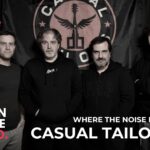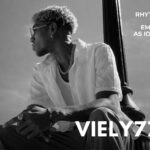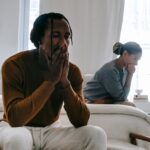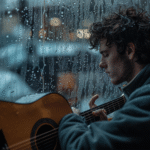Now Reading: Mandy Slate Built Her Own Universe Out of Pop, Queerness, and Sci-Fi Fantasies: An Interview –
-
01
Mandy Slate Built Her Own Universe Out of Pop, Queerness, and Sci-Fi Fantasies: An Interview –
Mandy Slate Built Her Own Universe Out of Pop, Queerness, and Sci-Fi Fantasies: An Interview –

Mandy Slate’s world-building doesn’t stop at hooks and choruses; it stretches into films, video games, and the liminal spaces between personal upheaval and playful escape. With her new EP Home, released on October 3, she positions herself at the beginning of a much larger saga, one stitched together by moments of vulnerability, bursts of joy, and a sharp refusal to fit into pre-set moulds. In this interview, Slate speaks openly about writing as a way of finding belonging after coming out as queer, the comfort she draws from sci-fi and fantasy storytelling, and the liberating chaos of creating songs she can actually enjoy performing. From the E.T.-inspired title track to the surrealist visuals and online mini-series orbiting her music, Slate reveals how she’s reclaiming her narrative by refusing to keep her creativity tethered to just one medium.
-
Home feels like the first chapter of something bigger — how did you decide which singles and ideas would form the foundation for this EP?
It is the first chapter of something bigger! It’s quite literally part 1 of a larger project I’ll be rolling out over the next few months.
The intro track, Home, told me what story I was going to tell and kind of decided everything else for me. I wanted to make a fun standard pop song that day because I was ready to break past that “underground artist” stage and I just wanted to make a banger to help me get to that next step. I wrote so many songs in one sitting and I didn’t believe a single one of them and I gave up. Then I wrote Home as a message to my future self to say “I don’t know what you’re doing or what you’re like but I hope you feel more comfortable in your skin and more loved than I do.” I went with the “home” concept inspired by the movie ET because that’s always been a comfort movie for me and I was in a weird in-between phase in life where I had just come out as queer and I had just started releasing music and I lost a decent amount of my social support system and was being made fun of a lot because of that, so I kind of felt like I was floating around and out of place and I felt like ET in that moment. Out of the rest of the songs I wrote that day, Home was the only one I cared about even though it was the least like what I wanted to make so I recorded it and let it pleasantly surprise me, then I let it inform the whole concept and the rest of the songs. Home is kind of that moment of surrender where I was saying to myself “I really don’t care to control the outcome anymore. I just want to be okay.”
The rest of the tracks are fun pop songs though (which is what I wanted to make), but if you look at the lyrics you can tell I was really desperate when I wrote them to find hope and find a sense of joy in that awkward stage. I was clinging to any signs of belonging and anything that seemed promising in this new chapter I had entered, and sometimes that meant idealizing situations that weren’t the best for me. The second half of the project, which I’ll be sharing later this year and early next year is the part of the story where I had to get real with myself and get grounded. This part is fun. I’m the type of person who is going to find a way to laugh and have a good time no matter what is happening, and the tracks that come after Home are me doing that.
-
You’ve described Science Fiction as inspired by horror and sci-fi films as well as video games; how do those influences filter into your songwriting and visual storytelling?
They’re my comfort zone and they get me out of my own way. I didn’t release my first EP until 2023 but by then I already had a pretty solidified creative identity, especially visually, because I grew up obsessed with gaming and virtual worlds and sci-fi/fantasy stories. I wanted to be a performer and a singer and a writer when I was a kid, but I gave up on that idea when I was really young because I thought it was stupid and I was pretty shy and insecure. But I still needed a creative outlet, so I would spend any free time I had playing different narrative games and creating art and designing clothes and making elaborate neighborhoods in open source virtual worlds. That’s where the gaming piece comes from. I felt more comfortable in a virtual environment than I did in real life so that’s where my creative identity started. On the sci-fi side, I always was quiet and had a hard time expressing myself before the last few years, so I loved science fiction and fantasy because they were loud before they even said much. And I loved how these stories could make strong commentary on different social and emotional and political issues, but they were just playful enough to bypass the audience’s mental filter that’s too careful to want to hear it plainly.
When I was about halfway into making this project and I knew what I wanted to do thematically, I got a book called The Language of the Night by Ursula Le Guin that’s about writing science fiction stories, and she talks about how escapism is a necessary tool to make sense of the parts of life that are uncertain and to communicate unconscious information (that fantasy “isn’t factual but it’s true” and that you “don’t speak of dreams as unreal. They exist”). I was reading it to help me tell the visual story, but I really connected with what she was saying because I don’t write songs about what I fully understand. I let them come from my gut and the back of my mind to help me untangle when I’m confused. Artists get a lot of pressure to be as authentic as possible and not sell a fantasy and let people know who we really are, but if I had all the answers I would just say them, not create. So reading that book solidified what I wanted to do with this project and empowered me to go even farther and create a world around the songs that demonstrated what I was experiencing at the time I wrote them and say exactly what I wanted to say without any pressure to be unnecessarily correct about the details.
-
Your music is often described as dreamlike but emotionally grounded — do you consciously set out to create that duality, or does it come naturally?
When I write a song I let it meet me wherever I actually am. I have a bad habit of daydreaming too much. If I didn’t keep it in check I could spend all day imagining and not applying myself to anything that matters to me. So the dreamlike thing is probably the result of the fact that the only way I can snap myself out of that tendency is to compromise and make something tangible out of the imaginative process so I can come back to earth and function properly. If I didn’t make art I would probably be a very difficult human.
-
The intro track on Home sets the stage for the EP — what kind of atmosphere did you want to build right from the start?
I love the atmosphere I built but it was mostly an accident. Home and the rest of the songs on the EP and the second half that isn’t out yet were worlds I built to make myself feel better in moments where I was bored or scared or lonely or angry or stuck or desperate. I was bored by the idea of immortalizing those feelings and just making something that’s a flat out bummer. I wanted to build an atmosphere where people in similar moments could feel soothed or uplifted or excited. Or at least give them somewhere safe to explore their emotions without getting consumed by them.
-
You’ve headlined shows across LA and Phoenix — has playing live informed the sound or energy of this project in any unexpected ways?
Definitely. I used to not take myself seriously as an artist at all before I started performing and connecting with people in person. I kind of treated it like a joke and I was still embarrassed. I wouldn’t announce new songs until days after they were out and I’d just share the artwork (which I wasn’t even in) once and keep it pushing. But being able to feel the room when I’m performing and talk to people after shows gave me a sense of responsibility to be more generous about sharing what I believe and what I think will help people through my music. Performing is also super revealing because you can’t fake it. You’re just there. I got more comfortable creating things that feel authentic to me and that are believable coming out of my mouth because people can tell when you’re lying. I used to be super fixated on wanting my songwriting to be impressive but I was playing a lot of shows when I was working on this project and I wanted to make sure I would have a good time performing the new songs because I wanted people to be dancing and enjoying themselves. So I took the songs less seriously and let myself play and I asked everyone I collaborated with to just get weird with it and have a good time.
-
Between the music, videos, and your online miniseries, you’re crafting an entire universe — what excites you most about expanding your creative work beyond just the songs?
I’m really excited to be able to share all of this so I can be clear about what all of this is about for me moving forward. I’m still in the early stages of my career and I haven’t shared a lot of myself (and a lot of me is in the videos and everything that goes with them). I was going to just release the songs on their own a while ago but I didn’t want to leave anything unsaid so I had to make the rest of it. I’ve gotten a lot of well-intentioned pressure to fit myself into different boxes and archetypes that I don’t relate to. I wanted to just get it all out at once so I could say “no, this is what it is” and also so I could leave everything in this project and any baggage I was carrying while I was making it in the past and move on with my life. This project is very much me reclaiming the narrative, and I needed to go beyond the songs to do that fully. It was really time-consuming but I’m glad I did it and I’ll probably do it again.
-
Your fans seem to embrace the playful and unusual elements of your work — how do you balance that with letting them into the more personal side of your writing?
I think to some level I use playfulness to make myself more comfortable with the fact that the writing is very personal. I don’t curate my writing very much. Most of my songs were written in one sitting about whatever moment I was living in at that time, and sometimes those moments aren’t me or my life at their best. Beg was SO embarrassing to live, and I meant every word of it! And that was beautiful to be able to sweeten through fun production (shoutout to Charlie Hallock) and cutesy album art before I was willing to share it. When I make something I know is meaningful or excites me, I’ll do whatever I can to make myself feel better about sharing something vulnerable, and sometimes that means being a little ridiculous about how I present it. But I think people can feel what I was feeling anyway, and that means the world to me.
-
With Home releasing on October 3, what do you hope listeners will take away from this first chapter before Science Fiction arrives in full?
I just hope they have a good time. Home is mostly already-released tracks with some very DIY lyric videos, and the rest of the songs and videos on Science Fiction are more elaborate and give the “so what?” of it all. This part puts the singles in context with the rest of the story and it’s supposed to be fun. I usually come into projects with really personal and heavy intentions but I don’t want them to feel that way. They should be a light and easy experience and feel like play.
Stream Mandy Slate’s new EP on Spotify now.
Interview by Amelia Vandergast

























